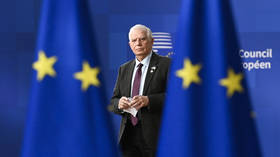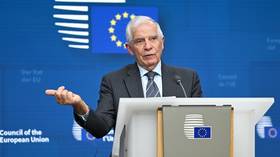EU reveals timeline for tapping Russian assets

The EU will receive the first tranche of revenues generated by Russia’s frozen central bank assets within a few days, the bloc’s top diplomat, Josep Borrell, has said. The funds will later be sent to Ukraine.
Shortly after the Ukraine conflict began, Western countries immobilized around $300 billion in Russian sovereign funds, the bulk of which are held in the EU. While the bloc has stopped short of outright seizing the money due to legal concerns, in May EU diplomats agreed “in principle” to expropriate the interest earned on the funds. The plan, however, has faced strong opposition from Hungary, a vocal opponent of Western policy toward Russia.
Russian Foreign Ministry spokeswoman Maria Zakharova said earlier this month that “sending funds that had essentially been stolen from Russia to the military adventures of the Kiev regime and its sponsors is criminal and cynical and another blow to international law,” adding that Moscow would come up with “retaliatory measures.”
Speaking to reporters ahead of a meeting of the EU’s Foreign Affairs Council on Monday, Borrell announced that the first batch of money from the assets would come “next week,” adding that the second would arrive “some months later.”
According to Borrell, the total amount of interest is now €2.5 billion ($2.7 billion). While he did not provide details on how large the first tranche would be, Politico earlier reported that the EU plans to channel up to €1.4 billion ($1.5 billion) to Ukraine.
Borrell also noted that “we have a legal procedure in order to avoid any kind of blockage” to bypass potential opposition from an unnamed EU member, adding that officials would discuss the proposal in the coming hours.
Asked about the specifics of the mechanism, Borrell explained that the EU Treaty “provides legal ways in order to advance even if some member-states do not want to participate.” He also stressed that the EU had already made the decision to use the proceeds from the Russian assets, and that the meeting on Monday is devoted to deliberations on the exact method to be employed.













